|
Report from
Europe
FLEGT products biggest winners in EU tropical wood market
An analysis of EU trade data by the FLEGT Independent Market Monitor
(IMM), an ITTO project funded by the EU, shows that FLEGT licensed
products from Indonesia, particularly wooden furniture and doors, were
on course to be the biggest winners in the EU tropical timber market
last year.
Overall the EU¡¯s trade in tropical wood and wooden furniture products
was more buoyant in the first nine of months of 2019 than the same
period in 2018.
Chart 1 shows twelve monthly rolling total US$ value of imports (to iron
out seasonal fluctuations) from tropical countries into the EU of all
wood and wooden furniture products listed in HS Chapters 44 and 94
(excluding fuelwood, wood waste and chips).
The 12-month rolling total fell to a low of US$3.99 billion in June 2017
but had rebounded to US$4.35 billion by September 2018 and gained an
additional US$0.28 billion in the following 12 months to reach US$4.63
billion by September 2019.
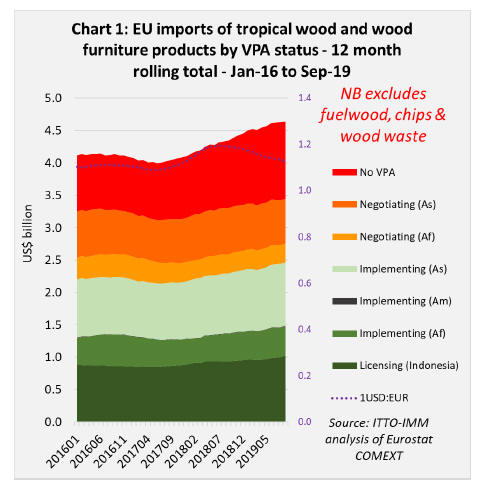
Initially, the recovery in the US dollar value of EU imports was driven by
exchange rate fluctuations as the euro increased sharply in value
against the US dollar in 2017. However, from mid-2018 to mid-2019, the
euro was weakening against the US dollar and the rise in dollar import
value coincided with a genuine increase in import quantity.
Chart 2 shows that the 12-month rolling total quantity of EU tropical
wood and wooden furniture imports dipped to 2.5 million metric tonnes
(MT) in March 2018, then increased to 2.8 million MT in June 2019,
remaining at that level through to September 2019.
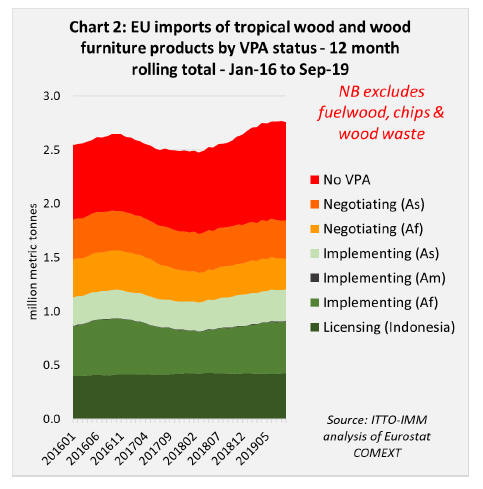
Indonesian Licensed products feature prominently in the league table of
the largest gains in EU tropical wood product imports in the year to
September 2019 (Chart 3).
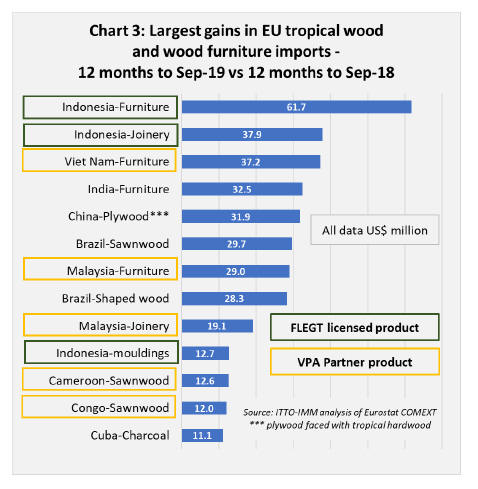
Indonesian furniture led the way with imports in the year to September
2019 being US$61.7 million greater than in the previous 12-month period.
Indonesian joinery products were in second place, gaining US$37.9
million in the same period. Indonesian mouldings/decking made it on to
the list of big gainers, adding US$12.7 million.
There was also a small gain in EU imports of Indonesian plywood, which
were US$3.6 million greater in the year to September 2019 compared to
the previous 12-month period.
This occurred despite a background of intense direct competition from
Russian birch plywood products. IMM contacts with EU plywood importers
suggest that prices for Russian products are highly competitive due both
to low prices for birch logs in Russia and continuing weakness of the
Russian rouble.
Amongst VPA countries other than Indonesia, significant gains were also
seen in EU imports of furniture from Viet Nam and Malaysia, joinery
(mainly laminated wood) from Malaysia, and sawnwood from Cameroon and
the Republic of Congo.
Less positive from a FLEGT perspective is that two Indonesian product
groups ¨C sawnwood and veneer - also appear in the list of the biggest
losers in the year to September 2019, although the deficits are more
moderate than for Malaysia which suffered a particularly sharp decline
in EU imports of sawnwood (Chart 4).
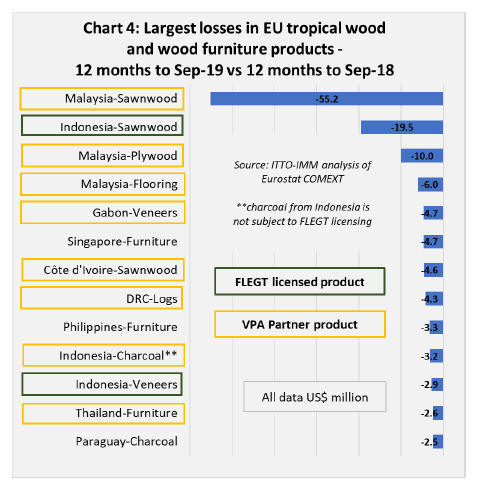
Much of the recent growth in EU imports of Indonesian wood and wooden
furniture products has been destined for the Netherlands and UK (Chart
5). Last year¡¯s surge in imports of Indonesian wooden furniture was
destined mainly for the Netherlands. The UK is the largest growth
destination for wooden doors and plywood from Indonesia. Most EU imports
of decking and mouldings from Indonesia are destined for Germany and the
Netherlands.
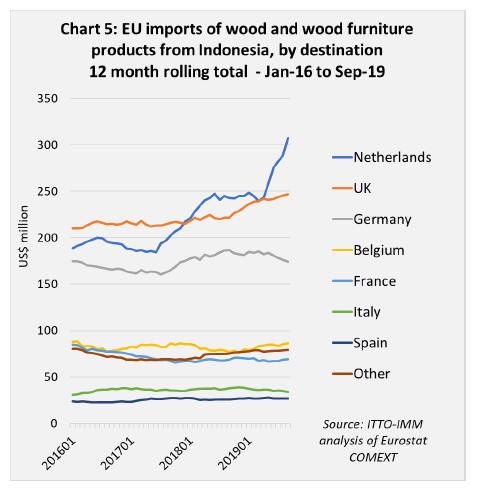
Campaign to promote FLEGT licensed timber
The UK Timber Trade Federation¡¯s FLEGT communication project is planning
to take installations featuring FLEGT-licensed timber around the EU in
2020. The initiative is funded by the UK Department for International
Development under its Forest Governance, Markets and Climate programme
(FGMC).
Last year the TTF project promoted FLEGT at the Brussels Furniture Fair
and several conferences and organised a Tropical Trade Forum at the
TTF¡¯s London headquarters.
It also supported an installation called Momento, designed by students
using FLEGT licensed balau as part of the London Festival of
Architecture.
The 2020 installation will be called Conversations and will feature
seating in FLEGT-licensed timber created by craft students and leading
designers, intended to stimulate discussion about FLEGT and using legal
and sustainable tropical timber. After a pilot in the UK it is intended
to set up in prominent locations across the EU.
The TTF campaign will run more seminars, develop an e-learning resource
for architects and contractors. It is also liaising on FLEGT with
Chinese timber trade bodies. Under the FGMC grant, the Federation is
also backing a timber marketing advisory programme being undertaken by
the Global Timber Forum in Ghana and Indonesia.
Indonesia loses GSP status in the EU
As of 1 January 2020, Indonesia no longer qualifies for
Generalised Scheme of Preferences (GSP) tariff rates on Wood and Wood
Products in the EU.
The GSP system has ¡®graduation mechanisms¡¯ for ascertaining a country¡¯s
eligibility for preferential duty rates. These include the value of its
exports of specific goods to the EU as a percentage of all EU GSP
imports of those products. According to the EU, Indonesia exceeded the
ceiling of 57% under this calculation for three years, so losing its GSP
status.
It remains to be seen whether removal of Indonesia¡¯s GSP status from 1st
January 2019 will have any significant impact on EU imports.
Loss of GSP status will have no effect on trade in those products like
decking/mouldings and most wooden furniture which are zero tariff for
all EU imports. However, it means higher tariffs for Indonesian plywood,
veneers, and planed, sanded and finger-jointed sawn timber.
For plywood, probably the most significant Indonesian wood product
influenced by GSP status, the tariff has increased from 3.5% to 7%.
EU imports from Myanmar continue despite EU prohibition
At their December meeting, the EU Expert Group on EUTR and FLEGT,
comprising representatives of the EC and government authorities from
across the EU, reiterated their view that it is not possible to
demonstrate a negligible risk that any timber from Myanmar is legally
harvested in line with EUTR definitions.
According to the Expert Group this is due to ¡°lack of sufficient access
to the applicable legislation and documentation from governmental
sources¡±.
This opinion of the Expert Group, which reiterates previous conclusions
made at earlier meetings in June and September, implies that any
operator placing Myanmar timber on the EU market will be liable to
prosecution for failure to undertake adequate due diligence under the
terms of the EUTR.
Authorities in several EU member states have sanctioned operators
trading in Myanmar teak. In the three years since 2017, a variety of
legal cases have been brought against importers of teak in Belgium,
Denmark, Germany, Netherlands, Sweden, and the UK, involving
confiscation of the timber or requiring it¡¯s return to Myanmar, and
additional sanctions such as fines.
The report of the Expert Group¡¯s December meeting indicated that
additional cases are now being brought in the Czech Republic and
Austria. The Expert Group observed that these enforcement activities are
leading to changes in the direction of trade around the EU.
ITTO¡¯s own analysis of trade flow data confirms that there have been
significant changes in the direction of trade, but no sign of decline in
overall imports from Myanmar. EU imports of wood products from Myanmar
were valued in excess of US$50 million in the 12 months to September
2019, double that of 5 years before.
During this period imports into Italy increased four-fold to over US$30
million (Chart 6).
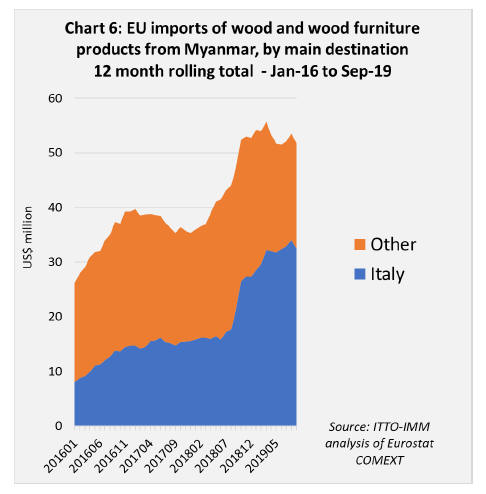
During the same period direct imports from Myanmar into Germany,
Netherlands, Belgium and Denmark fell to negligible levels. However, in
addition to Italy, there was a significant increase in imports (from a
very small base), into Greece, Croatia and Sweden. Imports into France
remained low but consistent at around US$2 million per year (Chart 7).
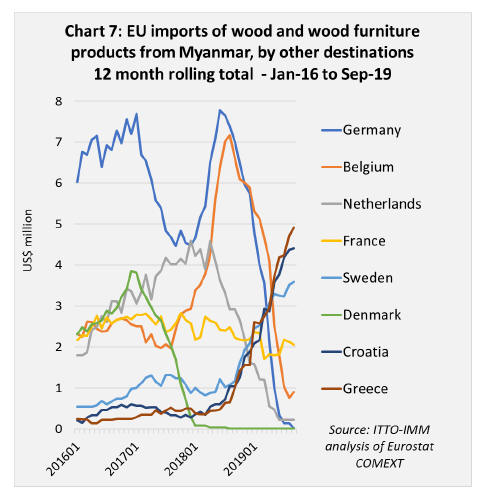
The continuing reluctance of EU officials to accept that negligible risk
of illegal harvest can be demonstrated in Myanmar comes despite
additional information and wide-ranging discussion of EU due diligence
requirements at a national FLEGT multi-stakeholder dialogue held in Nay
Pyi Thaw, Myanmar, in November.
According to a report on the dialogue in the minutes of the EU Expert
Group meeting in December, ¡°this multi-stakeholder group (MSG) was set
up in the course of the pre-preparatory process towards a VPA in
Myanmar¡±, although ¡°already last year it was made clear that the [VPA]
process was halted¡±.
The MSG, which operates at national level with associated regional
groups, includes representatives of government (including State-owned
Myanmar Timber Enterprise, MTE), private sector and civil society
organisations (CSOs). The dialogue meeting in November involved about
150 people.
The dialogue was funded and facilitated by the EU FLEGT facility and the
FAO-EU FLEGT Programme. The EU Expert Group minutes go on to note that
¡°although the VPA process is stopped, having the MSG as an interlocutor
is very helpful in the strife for improved forest governance and law
enforcement in Myanmar¡±.
The EU Expert Group minutes state that ¡°Myanmar applied for funding from
the FAO-EU FLEGT Programme for further multi-stakeholder meetings to
prepare a work programme for activities that could be funded by the
Programme from 2020-2021 and build capacity to submit quality project
proposals¡±.
¡°The intention is to ensure ownership of the process [in Myanmar] of all
stakeholders and at the same time avoid the pursuit of (often costly)
activities promoted by some stakeholders predominantly interested in
trade, which, in the end, do not constitute adequate measures to ensure
good forest governance and legal timber harvest¡±, according to the EU
Expert Group minutes.
The EU Expert Group meeting minutes conclude that ¡°dialogue with Myanmar
has clarified what issues must be addressed in order to outline a way
forward towards good forest governance and legal timber harvest, which
would provide sufficient transparency to enable operators to carry our
due diligence correctly and adequately mitigate to a negligible level
the risk of illegal harvested timber being placed on the internal
market. It also showed avenues for working together with IMM in this
context, without giving false expectations¡±.
The EU Expert Group also ¡°took note of the fact that the Annual
Allowable Cut (AAC) for the 2019/2020 season was made available online
in November¡±.
However, the EU Expert Group also note that ¡°other applicable
legislation is not fully accessible for EU operators within the meaning
of Article 6 (1)(a) of the EUTR, enabling operators to fully comply with
Article 5 of Implementing Regulation (EU) No 607/2012, e.g. because it
is declared internal or it only exists in Burmese.
Full risk assessment and choosing and applying adequate mitigation
measures to address each of these risks is therefore not possible¡±.
EU invites feedback on EUTR and FLEGT Regulations
The EU Commission is calling for public feedback on the functioning of
the FLEGT Regulation and EUTR, the two key legal instruments of the
FLEGT Action Plan. According to the EU Commission, this ¡°fitness check¡±
will consider ¡°the effectiveness, efficiency, coherence, relevance and
EU added value of both regulations [and] will help assess whether the
instruments are fit for purpose or need to be revised¡±.
Findings of the fitness check will also be considered in the assessment
of demand-side measures for other commodities associated with
deforestation. Commitments to this effect are embedded in a
¡°Communication on Stepping up EU Action to Protect and Restore the
World¡¯s Forests¡±, which the Commission adopted in July 2019.
Comments on the EUTR and FLEGT Regulations can be submitted until 28
February 2020 at the following link:
https://ec.europa.eu/info/law/better-regulation/initiatives/ares-2020-581028-0_en
New VPA partner profiles on IMM website
The FLEGT IMM website now features detailed profiles of all VPA
partner countries that have either reached the FLEGT Licensing stage
(Indonesia) or are implementing a VPA (Cameroon, Central African
Republic, Ghana, Guyana, Honduras, Liberia, Republic of Congo, and Viet
Nam).
The profiles include overviews of countries¡¯ forestry sectors, timber
industry and trends in global trade in timber and timber products as
well as more detailed analysis of trade with the European Union. The
profiles also contain a summary of each country¡¯s progress in VPA
implementation.
More country reports of currently still negotiating countries will be
added as soon as the VPA with the EU is signed and work to implement a
FLEGT Licensing system is underway.
More details at:
https://www.flegtimm.eu/index.php/vpa-countries
UK plans to spearhead crackdown on illegal timber
According to an article in the Guardian newspaper, the UK wants
to spearhead ¡°a major global crackdown on illegal timber and
deforestation¡± by forming a coalition of developing countries against
the trade as part of its hosting of UN climate talks in Glasgow in
November this year.
According to the article ¡°all countries are expected to come forward
with tougher plans to reduce global emissions as part of COP 26, and
experts have said this will only happen if the UK takes the lead in
forming a coalition of small and big developing countries, including
forested African nations and Indonesia, as well as major economies such
as the US, China, India and the EU¡±.
The new project, still in the planning stages, will build on the UK
government¡¯s forests governance, markets and climate programme, the
focus of which includes strengthening the rule of law in affected
countries in the developing world, influencing international partners to
increase their efforts, supporting responsible trade and helping
stakeholders on the ground to act.
The article notes ¡°in 2005, only about a fifth of Indonesia¡¯s timber
trade was legal. But today, after interventions by the UK and other
partners, 100% of exports are sourced from independently audited
factories and forests¡±.
More details:
https://www.theguardian.com/environment/2020/feb/13/uk-lead-global-fight-illegal-logging-deforestation-cop-26
France requires public buildings to be at least 50% wood
According to the newspaper Times of London, President Macron
has ordered that new public buildings financed by the French state must
contain 50% wood or other organic material by 2022 under an ambitious
government plan for a greener urban life.
The government announcement, made on 5 February, is part of a drive for
sustainability by Mr. Macron, who wants France to set an example in the
face of climate change.
Julien Denormandie the minister for cities and housing, said the plan
would promote low-carbon towns ¡°that are capable of adapting to
heatwaves and floods. To show an example by the state, I am imposing on
all the public entities that depend on me and which manage development
to construct buildings with material that is at least 50 percent wood or
from bio-sourced material.¡±
According to the Times, bio-sourced material can include a vegetable
component such as hemp or straw.
Building works covered by the new 50% rule include urban development
projects co-financed by the state and local government in Paris and 13
other cities. According to the Times, in two decades some €9 billion has
been spent on these projects, which mix housing and business premises.
The Times also reports that Paris has promised to include a high level
of wood in all new construction for its 2024 Olympic games. Olympic
buildings of up to eight storeys must be 100% wood and if higher contain
some wood in their structure.
Elsewhere in France, according to the Times, work has begun on a
16-storey 181ft all-wood building with 98 apartments in Bordeaux, which
will be France¡¯s tallest wooden construction.
EU Commission urges Romania to stop illegal logging
The European Commission issued a letter of formal notice to
Romania on 12 February giving it one month to take the necessary
measures to address shortcomings in forest governance identified by the
Commission.
The Commission is urging Romania to properly implement the EU Timber
Regulation (EUTR), which prevents timber companies from producing and
placing on the EU market products made from illegally harvested logs. In
the case of Romania, the national authorities have been unable to
effectively check the operators and apply appropriate sanctions.
Inconsistences in the national legislation do not allow Romanian
authorities to check large amounts of illegally harvested timber. In
addition, the Commission has found that the Romanian authorities manage
forests, including by authorising logging, without evaluating beforehand
the impacts on protected habitats as required under the Habitats
Directive and Strategic Environmental Assessment Directives.
Furthermore, there are shortcomings in the access of the public to
environmental information in the forest management plans. The Commission
also found that protected forest habitats have been lost within
protected Natura 2000 sites in breach of the Habitats and Birds
Directives.
FAO statistics show that Romania is the EU¡¯s second largest producer of
hardwood sawlogs, after France, producing around 4.3 million cu.m in
2018. It is also the EU¡¯s largest single producer of sawn hardwood, with
production of 1.6 million cu.m in 2018. Much of this volume is exported,
mainly to China, North Africa and the Middle East, although exports
declined last year in response to cooling global demand.
At the International Hardwood Conference in Berlin in November last year,
the European Sawmillers Association EOS reported that prices for
Romanian sawn hardwood were falling and warehouse stocks were rising.
Efforts were being made to curtail Romanian sawn hardwood production
which EOS expected to be down up to 15% overall in 2019. EOS noted that
the whole wood sector in Romania is suffering from lack of access to
finance and low levels of investment.
The EU¡¯s formal letter implies that widespread illegal logging is
another factor contributing to unstable market conditions in the
country.
|